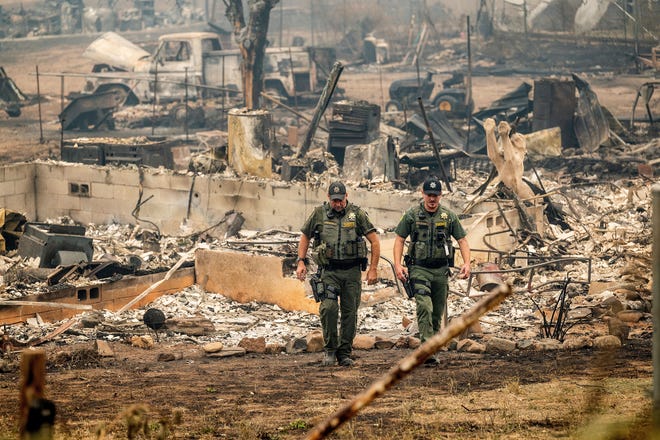YREKA, Calif. — Two more bodies have been found within the burn zone of a huge Northern California wildfire, raising the death toll to four in the state’s largest blaze of the year, authorities said Tuesday.
Search teams discovered the additional bodies Monday at separate residences along State Route 96, the Siskiyou County Sheriff’s Office said in a statement.
“This brings the confirmed fatality number to four,” the sheriff’s statement said. “At this time there are no unaccounted-for persons.” Other details were not immediately disclosed.
Two bodies were also found Sunday inside a charred vehicle in the driveway of a home near the tiny unincorporated community of Klamath River, which sustained major damage in the McKinney Fire, sheriff’s officials said.

“It’s really tragic when a fire gets up and moves this fast and basically takes out a community. And that’s what happened in the Klamath River area,” Mike Lindbery, a spokesperson with the fire’s incident management team, said Tuesday.
More than 100 homes, sheds and other buildings have burned in the McKinney Fire since it erupted Friday. The blaze remains out of control, authorities said.
The blaze near the state line with Oregon has burned nearly 88 square miles and is the largest of several wildfires burning in the Klamath National Forest.
As flames raged over the weekend, Franklin Thom fled his home in the small city of Yreka where he grew up on the edge of a national forest in California. He made it to a shelter with his daughter and just his medicine, some clothes and his shower shoes. Unlike some others, he was told that he had escaped with his home still standing.
“Keep your prayers out for us,” said Thom, 55.
A separate fire northeast of Happy Camp forced evacuations and road closures as it burned out of control Tuesday. Still more fires are raging in the Western U.S., threatening thousands of homes.
In northwestern Montana, a fire that started Friday afternoon near the town of Elmo on the Flathead Indian Reservation measured 20 square miles, fire officials said. Some people were forced to flee their homes as gusting afternoon winds drove the fire east.
DEATH TOLL HITS 37:Heat brings new concerns in eastern Kentucky flooding: What we know
The Moose Fire in Idaho has burned more than 85 square miles in the Salmon-Challis National Forest while threatening homes, mining operations and fisheries near the town of Salmon. It was 23% contained Tuesday, according to the National Interagency Coordination Center.
A wildfire raging in northwestern Nebraska led to evacuations and destroyed or damaged several homes near the small city of Gering. The Carter Canyon Fire began Saturday as two separate fires that merged. It was about 10% contained Tuesday.

Tuesday storms could spark new flames around McKinney Fire
The California fire started small, but exploded over the weekend as thunderstorm cells brought winds gusting to 50 mph at times.
Cloudy weather and some good rain helped firefighters Sunday night and Monday. Bulldozers managed to ring the city of Yreka with firebreaks, while crews carving out fire lines in steep and rugged terrain also were making progress, fire officials said.
The blaze was holding about 4 miles from Yreka, a scenic city of around 7,500 people.
“We’ve got the weather,” said Todd Mack, an incident fire commander with the U.S. Forest Service. “We’ve got the horsepower. And we’re getting after it.”
But the weather was a mixed blessing. Weekend lightning also sparked several smaller fires near the McKinney Fire, and despite the much-needed moisture, forests and fields in the region remained bone dry.

Yreka could see a high of nearly 90 degrees Fahrenheit on Tuesday, and the National Weather Service issued a red flag warning of extreme fire danger into Tuesday night because of the chance of lightning starting new fires and gusty outflowing winds from thunderstorms powering the flames.
Among those waiting out the fire at the shelter Monday was Paisley Bamberg, 33. She arrived in Yreka a few months ago from West Columbia, South Carolina.
NORTHWESTERN HEAT WAVE:At least 14 deaths suspected in Oregon after record-breaking hot spell
She was living in a motel with her six children, ranging in age from 15 to her 1-year-old twins, when she was told to evacuate. “I started throwing everything on the top of my truck,” but had to leave many things behind, she said.
Bamberg said she’d just been hired at an Arby’s restaurant and wondered if it will survive the fire.

“There might not be much there when we get back,” she said. “I don’t know if I have a job. The kids were supposed to start school and I don’t know if the school is still standing. I’m trying to keep up my spirits. I have six little humans that are depending on me. I can’t break down or falter.”
Scientists have said climate change has made the West warmer and drier over the last three decades and will continue to make weather more extreme and wildfires more frequent and destructive.
The U.S. Forest service shut down a 110-mile section of the famed Pacific Crest Trail in Northern California and southern Oregon. Sixty hikers in that area were helped to evacuate on Saturday, according to the Jackson County Sheriff’s Office in Oregon, which aided in the effort.